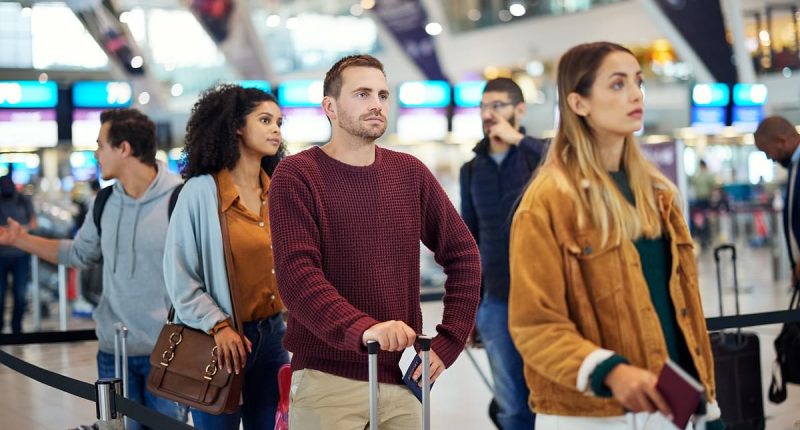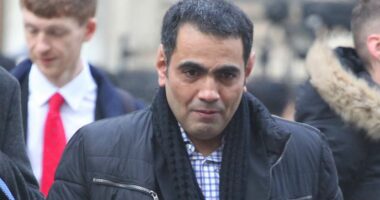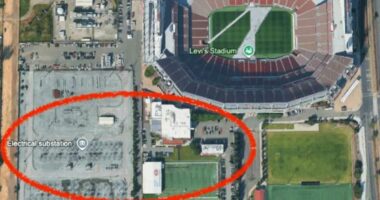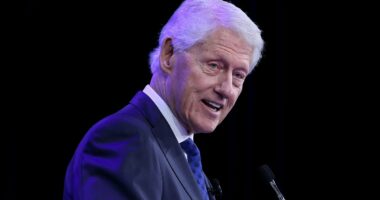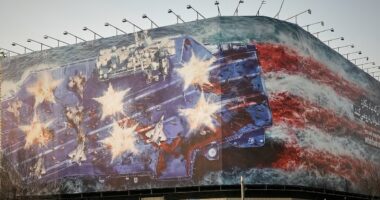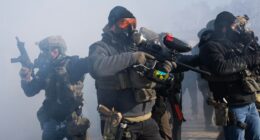Share this @internewscast.com
You look up. A camera captures your face. Within seconds, you’ve been scanned, stored, and tracked—before even reaching airport security.
Without ever handing over your ID, the Transportation Security Administration (TSA) already knows exactly who you are.
This is happening at 84 airports across the US. And chances are, you didn’t even notice.
Promoted as a measure to boost safety, the TSA’s facial recognition system is facing criticism over its potential to monitor Americans from the moment they enter the terminal to their ultimate destination.
While the agency insists the scans are voluntary, many passengers say they’re unaware that opting out is even an option.
Underneath these modern, contactless scanners is an extensive biometric database, prompting worries among experts about the potential use or misuse of the collected data by the government.
Jeramie Scott, senior counsel at the Electronic Privacy Information Center, referred to facial recognition as ‘an invasive and dangerous surveillance technology.’
‘That will ultimately accelerate the use of our faces as our ID, and that has some very important implications for privacy, civil liberties, civil rights and our democracy,’ he added.

Marketed as a tool to enhance security , TSA’s facial recognition system is drawing criticism for its potential to track Americans from the terminal entrance to their final destination
TSA’s facial recognition program, known as Credential Authentication Technology with Camera (CAT-2), scans a traveler’s face in real time and matches it to the photo on their government-issued ID.
Once verified, passengers can proceed without ever showing their physical license.
The technology is already in use at major US airports, including Los Angeles International, Atlanta Hartsfield-Jackson, and Chicago O’Hare.
But this is only the beginning. TSA plans to expand the program to more than 400 airports in the coming years.
Gerardo Spero, TSA’s Federal Security Director for Pennsylvania and Delaware, said: ‘Identity verification of every traveler prior to flying is a key step in the security screening process.
‘This technology enhances our ability to detect fraudulent IDs such as driver’s licenses and passports at checkpoints, and it increases efficiency by automatically verifying a passenger’s identity. We just want to ensure that you are who you say you are.’
However, the initiative has drawn significant criticism from privacy experts, civil rights groups, and lawmakers across the political spectrum.

Behind these sleek, touchless scanners lies a vast biometric database, which is raising concerns among experts about how the data might be used, or misused, by the very government that collects it
One concern is the lack of comprehensive federal regulations governing the use of facial recognition technology.
Speaking to HuffPost, Scott warned that ‘what may be the safeguards today does not mean they will be the safeguards tomorrow.’
According to the TSA, passengers who are uncomfortable with the facial recognition system can choose to opt out and request a manual ID check.
Saira Hussain, a senior staff attorney at the Electronic Frontier Foundation, regularly declines the facial scan when she flies.
But she says TSA agents often respond with statements like, ‘We already have your information, so it’s not like you’re giving us anything more.’
TSA’s long-term vision, outlined in its technology roadmap, is to create a fully ‘touchless’ and ‘frictionless’ airport experience, transforming your body into your boarding pass.
But what’s marketed as convenience by the agency is viewed as surveillance by others.

TSA’s facial recognition program, known as Credential Authentication Technology with Camera (CAT-2), scans a traveler’s face in real time and matches it to the photo on their government-issued ID
Travis LeBlanc, a lawyer and former member of the Privacy and Civil Liberties Oversight Board, warns that TSA’s placement within the Department of Homeland Security raises serious concerns about the use of traveler data.
‘TSA is part of the Department of Homeland Security, which is also responsible for immigration enforcement,’ LeBlanc said. ‘There are many potential uses for these images.’
In January, the Trump administration removed LeBlanc and two other Democratic board members. He is currently suing the U.S. government to be reinstated, arguing that the dismissal was unlawful.
Despite the criticism, TSA remains committed to expanding the program. In a recent statement, the agency said biometric screening will ‘improve security effectiveness’ and ‘enhance the passenger experience.’
For now, opting out remains an option. But as summer travel ramps up and facial recognition systems roll out to more airports, passengers are left to weigh the trade-off between speed and privacy.
